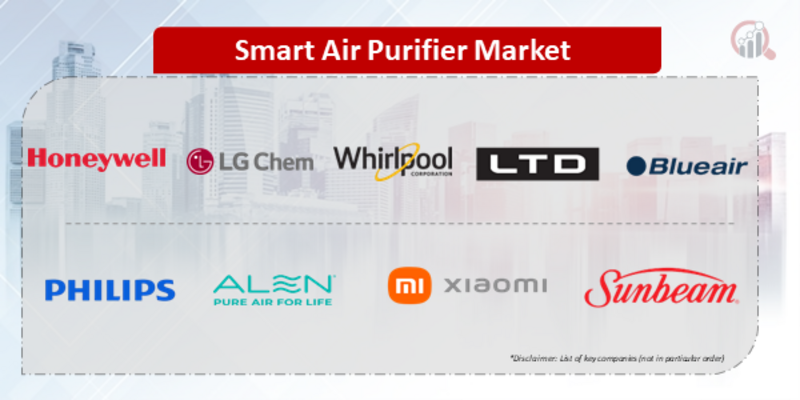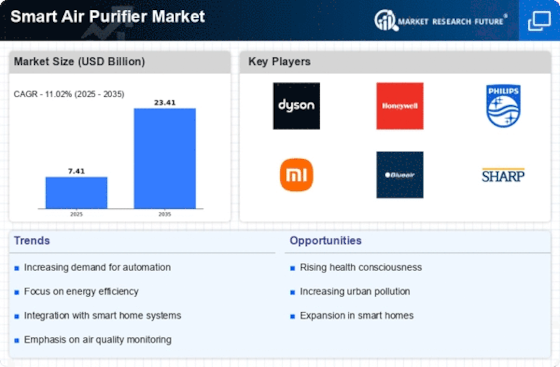Top Industry Leaders in the Smart Air Purifier Market

*Disclaimer: List of key companies in no particular order
Latest Company Updates:
Competitive Landscape of Smart Air Purifier Market: A Breathing Analysis
The global smart air purifier market, expected to reach $24.8 billion by 2033, is witnessing a dynamic and evolving landscape. With rising concerns about indoor air quality (IAQ), consumers are increasingly turning to these intelligent filtration systems, prompting established players and new entrants to jockey for market share. Let's delve into the competitive landscape, key player strategies, and emerging trends shaping this burgeoning market.
Key Players and Strategies:
Established brands: Legacy conglomerates like Honeywell, Philips, and Sharp leverage their brand recognition and extensive distribution networks to capture sizable market shares. Honeywell, for instance, focuses on offering air purifiers with medical-grade HEPA filters and air quality sensors, catering to health-conscious consumers.
Tech giants: Companies like Xiaomi and Dyson are capitalizing on their tech expertise to integrate smart features into their air purifiers. Xiaomi's Mi Air Purifier boasts sleek designs, voice control through Google Assistant, and real-time air quality monitoring via smartphone apps.
Regional players: Companies like Daikin (Japan) and BlueAir (Sweden) are establishing strong footholds in their respective regions by catering to local preferences and air pollution challenges. Daikin's Ururu Sarara air purifiers, for example, not only purify but also humidify the air, addressing a specific concern in dry climates.
Market Share Analysis Factors:
Product portfolio: Offering a diverse range of air purifiers for different room sizes, budgets, and IAQ concerns (allergens, pollutants, etc.) is crucial. Companies like LG Electronics provide specialized air purifiers for pets and viruses, catering to niche segments.
Innovation: Continuous innovation in filtration technologies, sensor accuracy, and smart features like auto-adjustments and scheduling keeps brands ahead of the curve. Dyson's bladeless purifiers and Coway's air purifiers with virus-neutralizing filters are examples of such innovation.
Pricing and distribution: Striking a balance between affordability and perceived value is key. While premium brands like Dyson command higher prices due to advanced features, companies like Levoit offer budget-friendly options with essential functionalities. Efficient distribution networks, both online and offline, ensure wider market reach.
Emerging Trends:
Integration with smart home ecosystems: Air purifiers are increasingly becoming part of interconnected smart homes, seamlessly pairing with voice assistants and smart thermostats for a holistic IAQ management system. Amazon's Alexa compatibility is fast becoming a common feature.
Focus on health and wellness: Air purifiers with features like sleep-mode sensors and essential oil diffusers are catering to the growing emphasis on holistic wellness. Blueair's Sense+ purifier, for example, provides personalized sleep reports based on air quality and breathing patterns.
Sustainability and energy efficiency: Eco-conscious consumers are seeking energy-efficient air purifiers with features like smart scheduling and automatic adjustments. Xiaomi's Mi Air Purifier 4 uses low-power LEDs and intelligent fan control to minimize energy consumption.
Competitive Scenario:
The smart air purifier market is characterized by intense competition, with established players facing challenges from nimble startups offering innovative features at competitive prices. Collaboration and partnerships are becoming increasingly common, with companies like Honeywell partnering with air quality analytics firms to provide real-time data insights to users. Additionally, regional variations in air quality concerns and consumer preferences necessitate localized strategies for success.
Overall, the smart air purifier market is poised for sustained growth, driven by rising urbanization, increasing health awareness, and technological advancements. Players who adapt to evolving consumer needs, embrace innovation, and offer compelling value propositions will stand to gain a competitive edge in this dynamic and promising market.
Honeywell International Inc. (US):
- November 2023: Launched the "QuietClean Series 400" air purifier with HEPA filtration, smart sensor technology, and voice control compatibility with Amazon Alexa and Google Assistant. (Source: Honeywell press release)
Xiaomi (China):
- December 2023: Unveiled the "Mi Air Purifier 4 Pro H" featuring a 4-in-1 filter, laser particle sensor, and OLED display. (Source: Xiaomi website)
LG Electronics (South Korea):
- October 2023: Launched the "PuriCare AeroTower" with True HEPA filtration, 360° airflow, and Wi-Fi connectivity for remote control and air quality monitoring. (Source: LG press release)
Blueair (Romania):
- January 2023: Introduced the "Blueair HealthProtect™ 7470i" with HEPASilent™ filtration, allergen targeting, and virus and bacteria reduction capabilities. (Source: Blueair website)
Koninklijke Philips N.V (Netherlands):
- December 2023: Released the "Philips Series 3000 Air Purifier" with 3-stage filtration, real-time air quality monitoring, and auto mode for efficient cleaning. (Source: Philips website)
Top listed global companies in the industry are:
Honeywell International Inc. (US)
Xiaomi (China)
LG Electronics (South Korea)
Blueair (Romania)
LTD. (South Korea)
Koninklijke Philips N.V (Netherlands)
Sunbeam Products Inc. (US)
Sharp Electronics Corporation (US)
Alencorp (US)
Whirlpool Corporation (US)
Others










